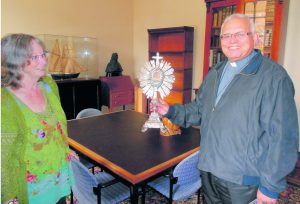by BEATE MATTHIES
AUCKLAND — The economic dimension of globalisation places
productivity and effectiveness as the values that orient human relationships, according to a visiting bishop from Guatemala.
Msgr Álvaro Ramazzini, Bishop of Huehuetenango in Guatemala,
visited New Zealand for the first time and gave a talk at the Mercy Spirituality Centre in Epsom, Auckland.

Auckland diocese Archives manager Narelle Scollay shows Bishop Alvaro Ramazzini Bishop Jean Baptiste Pompallier’s monstrance, which he brought to New Zealand in 1838. The monstrance is silver, but the silver is so fi ne the monstrance is relatively light.
Msgr Ramazzini challenged his audience with a critical view on globalisation. Guatemala is his native country.
This Central American country bordering Mexico is a country of
extremes, he said. Two per cent of the population own about 84 per
cent of the land; 73 per cent of the population is under the age of 23 years, and the unemployment rate is about 70 per cent.
With no industry, and mainly big plantations that belong to the few
rich people, there is not much future for young people, Msgr Ramazzini said. Many seek to escape poverty and misery by
trying to enter the United States — but they risk their lives when they try to cross deserts, fences and borders, and if they
make it to the United States, they are not welcome.If they are caught as illegal immigrants, they are jailed and deported.
Young people are frustrated, with little hope for any improvements in the country. With 60 per cent of the population earning
about $US3 a day, most families merely survive, the archbishop said.
There has been no agrarian reform in Guatemala and most people
own only a tiny piece of land — if any at all. Although that piece of land is not enough to feed the family, the temptation to use it for the cultivation of poppies for the money that may come from their yield of heroin is very high. Guatemala is on the land route for drug trafficking from South America to North America.
Guatemala is a country with vegetation like New Zealand. The biodiversity is enormous,but the country also has gold. Msgr Ramazzin in said that big Canadian companies are extracting the gold but are not creating jobs for the local population. “The people
of Guatemala don’t see much of their wealth.”
Only one per cent of the gains of those goldmines is given to the government.Environmental consequences, however,are plain to see and are threatening the health and wellbeing of the indigenous populations in those areas.
Bishop Ramazzini has been fighting for social justice for years. He
speaks up against injustice and risks his own life doing so. He understands that the economic dimension of globalisation promotes inequality and injustice and said: “The most important values
of truth, justice, love, and very especially of human dignity and the rights of others, are being subjected to the world market.”
The Catholic Church in Latin America is promoting a different kind
of globalisation he said: a solidarity of justice and respect of human rights. The accumulation of wealth and services does not make us happy.
Msgr Ramazzini drew the audience’s attention to the miseries of underdevelopment and superdevelopment. Those who have too much are likely to become victims of consumerism, with its negative (self-centred) attitude. He warned that a “throwaway” attitude of
consumerism could lead to a “throwaway” attitude directed towards human life and that would present a profound crisis in humanity.
Christianity, according to Msgr Ramazzini, is in a profound crisis
— one that Pope Paul VI saw when, during the Second Vatican Council,
he pointed out that the true vocation of the human person is to “be” and not to “have”. The essential of being a Christian is to love God and our neighbour — no matter who this neighbour is. If we exclude, by reason of poverty and misery, isn’t it time to question
ourselves and ask what is the future of our planet?
Bishop Ramazzini gave a radio interview to Beate Matthies. To hear
it: http://www.planetaudio. org.nz/bishopÁlvaroramazzini/
archive
• Bishop Álvaro Ramazzini is an active member of the Pastoral Commission for Peace and Environment (Guatemala). He received
several awards for his work for the poor and the marginalised
in his country. In 2005 he received the Konrad Lorenz Award, the Austrian State Prize for Environmental Protection. In 2011 he
received the Pacem in Terris Peace and Freedom Award, a prize “to honour a person for their achievements in peace and justice, not only in their country but in the world”. This award has previously
been won awarded to people like Martin Luther King, Jr., Dorothy Day, Desmond Tutu and Maria Julia Hernández.
Reader Interactions